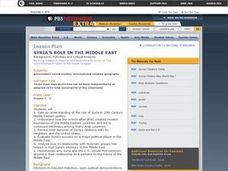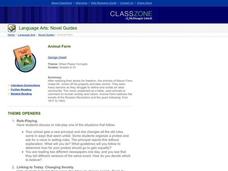Curated OER
P.H.A.T Log
Students complete a P.H.A.T Log which records their nutrition and daily activities. They complete a reflections journal based on the entries.
Curated OER
Political Parties Then & Now
Students research information about candidates both past and present. They role play a party member, the public or the press to present information.
Curated OER
Using Bar Graphs to Understand Voting Patterns
Bar graphs are used as a way to study voting patterns in the United States. A variety of statistical data is presented in the graphs, and pupils must interpret the data in order to make a report to the class. Three excellent graphs,...
Curated OER
Creating Hate: The Power of Words
Students explore why authors choose to use hate words in literature. In this power of words lesson, students complete group participation, journal entries, and written assignments to investigate the use of inflammatory language. Students...
Curated OER
Rev. Joseph Lowery: What Makes a Civil Rights Leader?
Learners examine the attributes of civil rights leaders. In this Civil Rights Movement lesson, students design "body biographies" of selected civil rights leaders after they have conducted research and discussed the qualities of leaders.
Curated OER
Presidential Trading Cards
Learners research the Internet to collect data about the US Presidents. They use the data that they collect along with available technology to produce trading cards and brochures using keyboarding skills, text boxes, acquiring photos,...
Curated OER
Introduction to Reform Movements of the 1800s
Eleventh graders consider the impact of reform movements of the 19th century. For this Progressive Reform lesson, 11th graders examine documents and images associated with women's suffrage, prohibition, and labor reform. Students respond...
Curated OER
Validating Votes
Explore the discrepancies in Florida's vote counting process in 2000 and 2002 with this New York Times reading lesson. Middle schoolers study the viewpoints presented in informational text, paying attention to how word choice can...
PBS
How to Teach Your Students about Fake News
What media literacy skills do people need to evaluate a news source? Scholars listen to and discuss an NPR story about how fake headlines often dupe young people and adults alike. Next, they study news stories, using a fact-checking...
Curated OER
Syria's Role in the Middle East
High schoolers hypothesize why Syria and the U.S. should find common ground in their relationship as it pertains to the future of the Middle East.
Curated OER
A Life in Politics
Students answer a quiz about congressional leaders. They research former majority leaders and create charts about them. They write letters to the current majority leader about a current issue.
Curated OER
Voting Simulation
Students explore the process of voting. They study the lawmaking branch of the state government.
Curated OER
Our Neighborhood as a Community
Students understand that they are a part of a community with helpers that make a difference. In this community service instructional activity, students explore the diversity in a community and how its members make it a nice place to...
Curated OER
Lincoln: The Man Who Needed Nevada
Students understand how Nevada became a state and the role of Abraham Lincoln in Nevada's statehood. In this Nevada statehood instructional activity, students listen to background information, primary sources and research about Nevada's...
Curated OER
The Civil War
Students are able to describe all of the Civil War terms. They are able to wonder why things happened. Students are able to tell that the United States used to be two countries.
Curated OER
Supplementary Angles
Students develop an understanding of the journalistic concept of the "news angle," by examining the newspaper coverage of an airplane disaster.
Curated OER
Valentine City
Students construct a small city on a table in the classroom. Each student is given a lot to develop. They give directions from one location to another, and write letters with correct addresses to their classmates.
Curated OER
Animal Farm
Students read Animal Farm and examine how power corrupts. They role-play situations involving power and control. They investigate corruption and abuse of power in society. They write propaganda articles and hold panel discusssionsabout...
Curated OER
Philanthropy in Literature Lesson 1: Definition of Terms
Students watch a video after which they define philanthropy and site examples of it in daily life. They use this definition as they work through the rest of the unit.
Curated OER
Probability and Statistics
Learners reason mathematically as they solve problems dealing with probability of an even occurring. In this probability lesson plan, students differentiate between different rankings of candidates running for leadership. They identify...
Curated OER
Electoral Versus Popular Vote
Pupils gain an understanding of how the winner of the popular vote might not be the winner of the electoral vote by voting on a snack. They be divided into groups with a representative.
Curated OER
Jerry Rubin, Abbie Hoffman, and the 60s Counterculture
Students identify how American society responded to the 1960's counterculture. In this 1960's America lesson, students investigate multimedia sources in order to examine the movement and its impact on the country.
Curated OER
Could the Civil War Been Avoided Through Compromise?
Students determine whether the American Civil War could have been avoided. In this Civil War instructional activity, students examine primary and secondary sources to prepare to participate in a classroom debate that requires them to...
Curated OER
The Solid South Switcharoo
Learners examine primary sources. In this lesson on political parties, students view historic documents, speeches, and photos to trace the rise and fall of particular political parties. Learners will be looking at the success of each...
Other popular searches
- Election Day Activities K 3
- Election Day Activities Math
- Election Day Activities K
- Post Election Day Activities

























